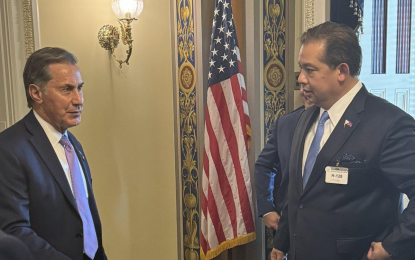
TRADE TALKS. Speaker Martin Romualdez (right) meets with Rep. Gary Palmer of Alabama’s 6th District at Capitol Hill, Washington D.C., on April 16, 2024 (Tuesday US time). Romualdez and his delegation discussed expanding trade opportunities and nuclear cooperation between the Philippines and the United States. (Photo courtesy of Speaker's office)
MANILA – Speaker Martin Romualdez has sought to advance bilateral trade relations and nuclear energy cooperation between the Philippines and the United States (US) in his meeting with House member Gary Palmer on Tuesday (April 16 US time).
According to a statement issued Wednesday, Romualdez led the Philippine delegation in a dialogue with Palmer, who represents Alabama's 6th congressional district, at Capitol Hill, Washington D.C. to discuss expanding trade opportunities and nuclear cooperation between the two countries.
During the meeting, Romualdez called for the revival of the US Generalized System of Preferences (GSP) trade program to spur more investments and generate jobs in the Philippines.
The GSP Program, established in 1974, has granted duty-free treatment to exports of certain products by developing nations into the US. The products range from electronics and agricultural products.
The program expired in December 2020 despite legislative efforts to extend it.
“Before the GSP program lapsed, the Philippines exported more than USD2 billion worth of goods tax-free to the US annually through the program,” Romualdez said.
“The program has been instrumental in creating jobs and investments in export manufacturing, benefiting both economies,” he added.
He said with the possible reauthorization of the GSP program, US buyers of Philippine products would benefit from the duty-free status of Philippine exports.
“This will lead to decreased prices in the US for these products and commodities, thereby easing inflation,” he said.
Romualdez also raised the possibility of forging a bilateral free trade pact, emphasizing the importance of innovative sectoral arrangements such as clean energy and sustainable transportation.
“We need to leverage Philippine resources and US technologies and investments, particularly in critical minerals to support the electric vehicle industry and the broader transition to clean energy, including nuclear energy,” he said. “With your support, we can make more progress in this area of our cooperation."
President Ferdinand R. Marcos Jr. earlier said the benefits of a free trade agreement between the two countries "will be transformative and will create new jobs, strengthen supply chains, establish new businesses, and upskill our workforce".
With respect to nuclear energy cooperation, Romualdez highlighted the significance of the 123 Agreement, which will allow the transfer of US-origin nuclear technology to the Philippines.
“The 123 Agreement lays the legal framework for potential nuclear power projects with U.S. providers and paving the way for streamlining the licensing requirements for the private sector with respect to investments on nuclear-related intangible transfers of technology,” Romualdez said.
The agreement was signed in November 2023 by US Secretary of State Antony Blinken and Philippine Department of Energy Secretary Raphael Lotilla on the sidelines of the 30th Asia-Pacific Economic Cooperation Leaders' Summit in San Francisco, as witnessed by President Marcos.
Improving national defense
Aside from Palmer, Romualdez also met up with US Senator William Francis Hagerty of Tennessee to promote national defense and regional security cooperation by expanding the joint military exercises between the Philippines and the US into multilateral engagements with other partner-nations.
He said the expanded multilateral joint military exercises in the Philippines would not only strengthen the country's defense strategy but would also foster stronger ties with other allies, ensuring peace and stability in the region.
He particularly cited the effectiveness of the Balikatan exercises with the US and related activities with other regional allies.
“These exercises have shown their significant importance in boosting our tactical and operational prowess. With this program, we can improve stability, security, and peace in the Asia-Pacific region and better safeguard our nation,” Romualdez said.
Romualdez also proposed increasing United States foreign military financing (FMF) to the Philippines from roughly USD40 million annually, as he expressed gratitude to Hagerty for introducing in the US Senate a bill that seeks USD500 million a year in FMF for the Philippines from 2025 through 2029, or a total of USD2.5 billion for five years, under the proposed Philippines Enhanced Resilience Act of 2024 (PERA Act).
“Given the strength of our alliance, the complexity of our evolving challenges, and our expanding engagements, I hope you will agree that the FMF also needs an increase,” Romualdez said.
The FMF program provides grants for acquiring US defense equipment, services, and training. It aims to promote US national security interests by contributing to regional and global stability, strengthening military support for democratically-elected governments, and containing transnational threats, including terrorism and trafficking in narcotics, weapons, and persons.
Aside from Romualdez, the Philippine delegation included Senior Deputy Speaker Aurelio Gonzales Jr., Deputy Speaker David Suarez, Majority Leader Manuel Jose Dalipe, Agusan del Norte Rep. Jose Aquino II, House Secretary General Reginald Velasco, Ambassador to the U.S. Jose Manuel Romualdez, Ambassador to Japan Mylene Garcia-Albano, and House Deputy Secretary Generals Jennifer Baquiran and Sofonias Gabonada Jr. (PNA)
